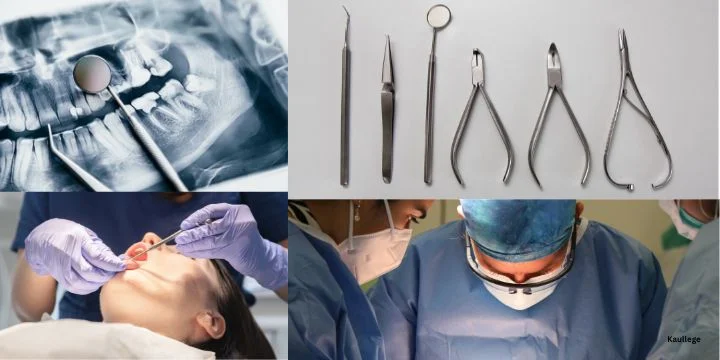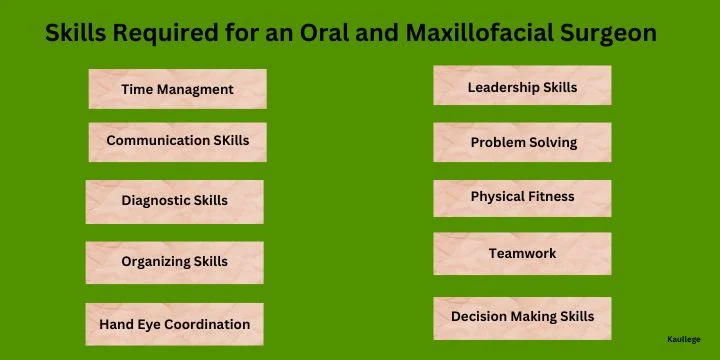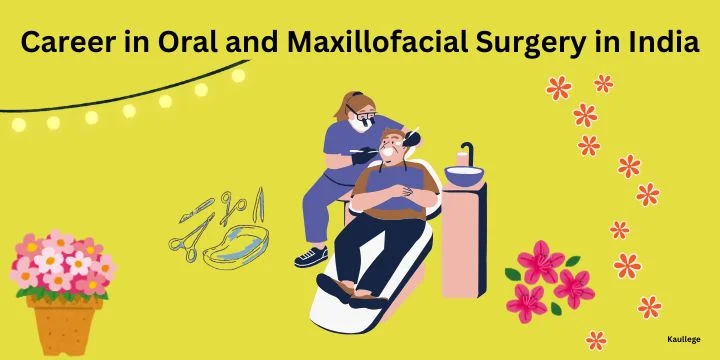A Career in Oral and Maxillofacial Surgery in India: The term “oral surgery” inherently suggests a focus on surgical interventions. Oral and maxillofacial surgery is a specialized field that emphasizes aesthetic procedures of the face, treatment of facial trauma, and surgical care of the oral cavity, head and neck, as well as the jaws. This specialty also encompasses cosmetic facial surgery and various oral surgical procedures, including those addressing cleft lip and cleft palate. Maxillofacial surgeons, commonly referred to as oral surgeons, are dentists who have undergone extensive training in this surgical discipline.
There are instances in which a dentist may refer a patient to an oral surgeon for procedures such as tooth extraction, bone grafting, jaw advancement surgeries, dental implants, or other surgical interventions. This article aims to inform readers about oral and maxillofacial surgery, assisting them in determining whether this career path aligns with their professional aspirations.
To gain a clearer understanding of the differences between an oral surgeon and a general dentist, as well as to explore the various responsibilities associated with the role of an oral surgeon, please continue reading the following article.
Key Information
The following provides a brief overview of the Career in oral and maxillofacial surgery curriculum in India.
| Particulars | Description |
| Course Name | BDS in Oral and Maxillofacial Surgery MDS in Oral and Maxillofacial Surgery PhD in Oral and Maxillofacial Surgery Certificate Courses in Oral Surgery Post Graduate Diploma in Oral and Maxillofacial Surgery |
| Course Duration | UG: 5 years PG: 3 years PhD: 3 years |
| Eligibility | UG:10+2 PG: BDS degree |
| Admission Process | NEET |
| Average Salary | INR 6 LPA |
| Career Options | Head of Surgery, Surgeon Partner, Dental Surgeon, Senior Associate, Doctor and resident physician |
What is Oral and Maxillofacial Surgery?
Many individuals often confuse dentistry with oral surgery. Dentistry is a branch of medicine that addresses issues related to the oral cavity. A practitioner in this field is known as a dentist, who is qualified to perform minor surgical procedures such as tooth extractions and the incision of small abscesses. Maxillofacial surgery represents a specific subset of dentistry, focusing on surgical interventions to rectify diseases, injuries, and defects affecting the face, jaw, or mouth.
An oral surgeon is a dentist who has specialized training in oral surgery, enabling them to perform intricate surgical procedures. The study of oral surgery encompasses topics such as transalveolar extraction, management of jaw fractures, midface fractures, temporomandibular joint disorders, jaw cysts, dental implants, and tumors.

Who is an oral and maxillofacial surgeon?
Oral and maxillofacial surgeons specialize in the treatment of conditions related to the face, mouth, and throat. They are skilled in performing a variety of surgical procedures, including tooth extractions, dental bone grafts, dental implants, periodontal surgeries, corrective jaw surgeries, sleep apnea surgeries, and repairs for cleft lip and palate.
How to become an oral and maxillofacial surgeon?
Typically, individuals aspiring to become oral and maxillofacial surgeons begin their education with a bachelor’s degree, although it is sufficient to complete the prerequisite courses required for dental school. These prerequisites generally include subjects such as general chemistry, organic chemistry, biology, physics, and English. The duration of dental school can range from three to five years, depending on the specific program. Admission to competitive oral and maxillofacial residency programs is essential, and candidates must achieve a strong score on the dental admission test. Furthermore, obtaining certification from the American Board of Oral and Maxillofacial Surgery is a standard requirement in this field. Continuous education is vital, as the scope of practice is continually evolving; for example, the treatment of sleep apnea has recently become part of the oral and maxillofacial surgeon’s responsibilities.
Various oral and maxillofacial surgery courses in India
To pursue a career as an oral surgeon or in the field of oral and maxillofacial surgery, individuals may obtain a degree by enrolling in specialized oral surgery courses.
| Course Name | Durations |
| BDS in Oral and Maxillofacial Surgery | 5 years |
| MDS in Oral and Maxillofacial Surgery | 3 years |
| PhD in Oral and Maxillofacial Surgery | 3 years |
| Certificate Courses in Oral Surgery | 3 months |
| Postgraduate Diploma in oral and Maxillofacial Surgery | 2 years |
How to gain admission to an oral and maxillofacial surgery course?
The admission process for these courses can differ among institutions. Some colleges conduct entrance examinations, while others select candidates based on merit. Most universities in India determine their selection criteria based on the candidate’s performance in a relevant national-level entrance examination.
Aspiring candidates must have completed their 10+2 education with a minimum aggregate of 50% in the science stream (Physics, Chemistry, and Biology) to qualify for the oral and maxillofacial surgery course.
Candidates must possess a NEET scorecard for admission into undergraduate programs. For postgraduate courses, candidates are required to have a NEET MDS scorecard.
Eligibility Criteria
Eligibility Criteria for Undergraduate Level
The following outlines the eligibility requirements for undergraduate programs:
| Particulars | Description |
| Age Limit | The minimum age limit is 17 years. |
| Qualification | 10+2 in science majors’ physics, chemistry and biology with a minimum of 50% aggregate marks |
| Qualifying Entrance Exam | NEET |
Eligibility Criteria for Postgraduate Level
The subsequent details pertain to the eligibility requirements for postgraduate programs:
| Particulars | Description |
| Qualification | BDS in Oral and Maxillofacial Surgery |
| Qualification Marks | Minimum of 50% aggregate marks |
| Qualifying Entrance Exam | NEET MDS |
Top 10 Institutions for Oral and Maxillofacial Surgery
Numerous institutions provide courses in oral and maxillofacial surgery. Below is a compilation of the top 10 institutions offering this program:
| Name of Colleges | Fee Structure |
| KM Shah Dental College and Hospital Vadodara | 9,75,000/- |
| Maulana Azad Dental College and Hospital New Delhi | |
| JSS Dental College and Hospital Mysore | 6,55,500/- |
| KLE Vishwanath Katti Institute of Dental Sciences Belgaum | 3,28,000/- |
| Dr DY Patil Dental College and Hospital Pune | 6,00,000/- |
| Bharati Vidyapeeth Deemed University Dental College and Hospital Pune | 13,00,000/- |
| Rural Dental College Loni | 11,00,000/- |
| Sharad Pawar Dental College and Hospital Wardha | 8,75,000/- |
| School of Dental Sciences Krishna Insitute of Medical Sciences Karad | 10,60,000/- |
| Meenakshi Ammal Dental College and Hospital Chennai | 4,50,000/- |
Colleges for Oral and Maxillofacial Surgery in India
The following institutions in India provide opportunities in oral surgery:
| College Name | Location |
| Amrita School of Dentistry | Kochi |
| AJ Institute of Dental Sciences | Karnataka |
| Shubharati Dental College | Meerut |
| Sri Sankara Dental College | Trivandrum |
| King George Medical University | Lucknow |
| SGT Dental College Hospital and Research Institute | Gurgaon |
| Manav Rachna Dental College | Faridabad |
| Santosh Dental College and Hospital | Ghaziabad |
| Subharati Dental College | Meerut |
| Institute of Dental Studies and Technologies | Modi Nagar |
| Divya College of Dental Science and Research | Modi Nagar |
| ITS Centre for Dental Studies and Research | Ghaziabad |
| Sharda School of Dental Science | Greater Noida |
Career Prospects in Oral and Maxillofacial Surgery
The role of a dentist has significantly evolved, extending beyond mere oral health care. Oral and maxillofacial surgeons are essential in treating patients with head and neck cancers, correcting congenital anomalies such as cleft lips, and aiding individuals with severe facial injuries.
Initially concentrated on dental procedures, this specialty now addresses a broad spectrum of surgical interventions that include facial and jaw trauma, oral and facial malignancies, infections of the sinus and throat, as well as both acquired and congenital facial deformities. The field has progressively expanded to encompass issues from the head to the throat. By utilizing cutting-edge technologies such as laser treatments and titanium implants, oral and maxillofacial surgery continues to present substantial opportunities for advancement and innovation.
Numerous government and private healthcare facilities provide employment opportunities for oral surgeons. Professionals in this field may establish their own clinics or collaborate as partners with other experienced oral surgeons. An oral surgeon may pursue various roles, including:
| Oral and Maxillofacial Surgeon (OMS) | Head of Surgery |
| Surgeon Partner | Dental Surgeon |
| Doctor and Resident Physician | Senior Associate |
| Dental Service Cheif | Oral and Maxillofacial Surgeon |
Types of Oral and Maxillofacial Surgeons
The following categories encompass the various types of oral and maxillofacial surgeons:
| Dental Implants | Anaesthesia |
| Dentoveolar Surgery | Surgical Correction of Maxillofacial Skeletal Deformities |
| Cleft and Craniofacial Surgery | Temporomandibular Joint |
| Maxillofacial Trauma | Reconstructive and Cosmetic Surgery |
| Orthognathic Surgery | Pathologic Conditions |
Essential Skills for an Oral and Maxillofacial Surgeon
Individuals aspiring to become maxillofacial surgeons must develop specific skills to secure employment in this field and advance their careers.
| Time Management | Leadership SKills |
| Communication Skills | Problem Solving |
| Diagnostic Skills | Physical Fitness |
| Organizing Skills | Teamwork |
| Hand eye Coordination | Decision making skills |

Responsibilities of an Oral and Maxillofacial Surgeon
An oral and maxillofacial surgeon is responsible for diagnosing and treating conditions affecting the mouth, jaw, face, or neck, which can range from dental issues to complex facial transplants.
- Consulting with patients
- Making precise diagnoses
- Prescribing appropriate treatments
- Coordinating investigations related to malignancies
- Performing surgical procedures
- Engaging in academic and research endeavors
- Undertaking supervisory and administrative responsibilities
- Addressing dental extraction issues
- Conducting orthognathic surgeries related to jaw alignment
- Executing facial reconstruction following traumatic incidents
- Removing tumors and cysts
- Performing biopsies on suspicious tissues to mitigate the risk of oral cancers
Compensation for an Oral and Maxillofacial Surgeon
In India, the salary for an oral and maxillofacial surgeon ranges from Rs 0.3 Lakhs to Rs 28.8 Lakhs, with an average annual income of Rs 6.0 Lakhs. These salary estimates are derived from data collected from 58 oral and maxillofacial surgeons.
| Job Profile | Average Salary |
| Private Practitioners | INR 6.7 LPA |
| Public Health Specialists | INR 5.5 LPA |
| Dental Lab Technician/ Ceramist | INR 8 LPA |
| Medical Representative/ Sales Representative | INR 8.5 LPA |
| Oral Pathologist | INR 9 LPA |
| Dental Hygienist | INR 5.1 LPA |
| Clinical Researcher | INR 7 LPA |


Leave a Reply